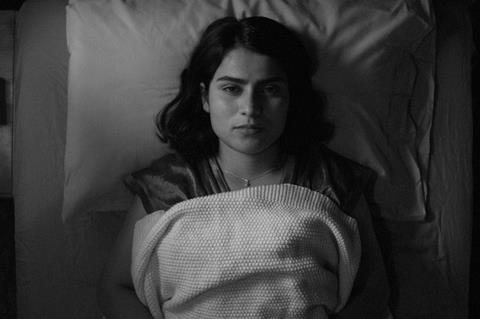
After world premiering at this year’s Sundance in the NEXT section, and also screening at SXSW, Babak Jalali’s fourth film Fremont has its international premiere at Karlovy Vary, where it it is vying for a Crystal Globe.
Born in Iran and raised in London, Jalali first came to prominence when his 2005 short film Heydar, An Afghan In Tehran garnered a Bafta nomination. His debut feature Frontier Blues premiered in Locarno’s official competition in 2009 while his sophomore effort Radio Dreams won the Hivos Tiger Award at the 2016 Rotterdam International Film Festival. His third feature, Land, premiered in the Berlinale’s Panorama in 2018.
Fremont is a dry comedy, shot in black and white, that follows the fortunes of Donya (played by Anaita Wali Zada), an Afghan immigrant who has fled the Taliban and now finds herself in the American city of Fremont. Working in a factory making Chinese fortune cookies, Donya finds herself isolated and alone. But – with the help of a fortune cookie – she decides to try and bring some order to her life.
The US film is produced by California outfit Butimar and New York- based Extra A Production. Last month, Music Box acquired North American rights from CAA Media. Fremont will be released in the UK this autumn by Modern Films. Memento handles international sales.
In Fremont, there is a sense that you are playing with the idea of a ‘refugee film’?
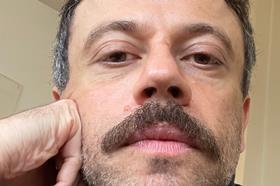
When Carolina Cavalli and I started writing the script together, we both knew that we didn’t want the main character Donya to come across as a victim. There is a tendency in films about immigrants to place responsibility on the audience to pity the characters. We wanted to show a character who has the same basic dreams and aspirations as any other human being from another country than her own.
The decision to make the lead character a woman was influenced by a generalised perception or rather misconception of Afghan women. They are often are portrayed as victims in the media, with little agency or determination. The reality is quite the opposite. It was very important too for Marjaneh Moghimi, the original producer of the film, who we started the project with and who sadly passed away ten days before we started shooting the film, that we highlight our main character’s refusal to conform to stereotypes.
The film is a solely US production, while your previous film was an international co-pro. How did you secure funding for the film?
Sudnya Shroff, who is a producer on the film, was instrumental in raising the funds for the film. She organised funding events and also reached out to investors individually, almost all of whom are based in the Bay Area. She also had a clear aim in who she approached so that those who came onboard were very much aligned with the story and were invested in the subject matter of the film. The people who put funds into the film were very generous and their faith is testament to the trust they had in Sudnya.
She has also been very involved in another element in the financing of the film which is a certain amount of the budget being set aside for social impact to assist and benefit Afghan women.
How did you cast Anaita Wali Zada, who was a well-known presenter and journalist on national television in her native Afghanistan?
When we started looking for someone to play the role of Donya in March 2022, we put out posts on social media and through Afghan community centres in North America. One day, Anaita emailed [having seen a social media post]. She told us that she had never acted before and that she had left Afghanistan on an evacuation flight in August 2021 when the Taliban returned and that she had been resettled in Maryland.
We arranged a video call and, from the first moment, I knew she was exactly right for the role. There were many aspects of Donya’s character she could relate to. Anaita is completely remarkable. We were so lucky to have her in the film.
Tell us about some of your personal influences.
Jim Jarmusch, definitely. Particularly his early films. And of course Aki Kaurismaki. There’s also Roy Andersson. Bill Douglas too. But there are other directors who’ve left a mark too. One who I should mention is Sohrab Shahid-Saless, an Iranian director who made two films in and around my hometown in the early 70’s and then continued his career in Germany. He’s no longer here, but he’ll remain special for a long while yet. I’m also mildly obsessed with The Hangover trilogy.
Why did you decide to film in black and white?
In one of the first conversations I had with Laura Valladao [the cinematographer], while we were talking references, I mentioned black and white and Laura was very enthusiastic. Her enthusiasm was very helpful in getting rid of any small doubts I may have had. This black and white question is one that is most often brought up and the honest answer is not very intellectual or perhaps even convincing - but the reason for it is purely one I had in my gut that this story, this film, would look prettier in black and white.
Can you tell us about forthcoming projects?
Yes, I co-wrote the adaptation of One Of The Boys with Daniel Magariel who is the original novelist. It’s a project that’s very dear to me and I hope to get it off the ground soon. There are also a couple of other things that I’m working on set in the UK and the US.




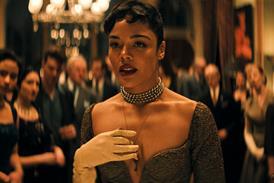


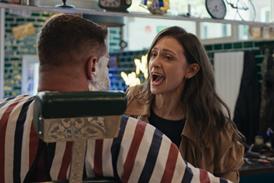




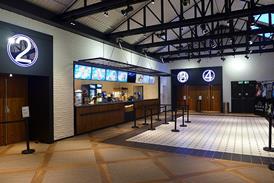
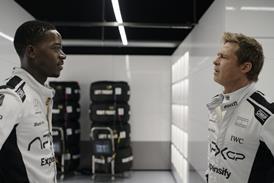











No comments yet